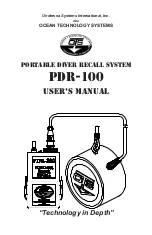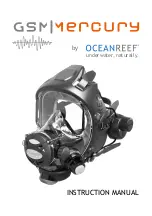
<5. CONFIGURATION>
5-1
IM 01F06F00-01EN
5. CONFIGURATION
This chapter describes how to adapt the function
and performance of the digitalYEWFLO to suit
specific applications. Because multiple devices are
connected to Fieldbus, it is important to carefully
consider the device requirements and settings
when configuring the system. The following steps
must be taken.
(1) Network design
Determines the devices to be connected to
Fieldbus and checks the capacity of the power
supply.
(2) Network definition
Determines the PD tag and node addresses for
all devices.
(3) Definition of combining function blocks
Determines how function blocks are combined.
(4) Setting tags and addresses
Sets the PD Tag and node addresses for each
device.
(5) Communication setting
Sets the link between communication
parameters and function blocks.
(6) Block setting
Sets the parameters for function blocks.
The following section describes in sequence each
step of this procedure. The use of a dedicated
configuration tool significantly simplifies this
procedure. Read APPENDIX 7 “LINK MASTER
FUNCTIONS” when the digitalYEWFLO is used as
Link Master.
5.1 Network Design
Select the devices to be connected to the Fieldbus
network. The following are essential for the
operation of Fieldbus.
• Power supply
Fieldbus requires a dedicated power supply. It
is recommended that current capacity be well
over the total value of the maximum current
consumed by all devices (including the host).
Conventional DC current cannot be used as
power supply.
• Terminator
Fieldbus requires two terminators. Read the
supplier for details of terminators that are
attached to the host.
• Field devices
Connect the field devices necessary for
instrumentation. The digitalYEWFLO has passed
the interoperability test conducted by The
Fieldbus Foundation. In order to properly start
Fieldbus, it is recommended that the devices
used satisfy the requirements of the above test.
• Host
Used for accessing field devices. A minimum of
one device with bus control function is needed.
• Cable
Used for connecting devices. Read “Fieldbus
Technical Information” (TI 38K03A01-01E) for
details of instrumentation cabling. Provide a
cable sufficiently long to connect all devices. For
field branch cabling, use terminal boards or a
connection box as required.
First, check the capacity of the power supply.
The power supply capacity must be greater than
the sum of the maximum current consumed by
all devices to be connected to Fieldbus. For the
digitalYEWFLO, the maximum current (power
supply voltage: 9 to 32 VDC) is 15 mA. The cable
used for the spur must be of the minimum possible
length.
5.2 Network Definition
Before connection of devices with Fieldbus, define
the Fieldbus network. Allocate PD tags and node
addresses to all devices (excluding such passive
devices as terminators).
The PD tags are the same as conventional
tag numbers assigned to devices. Up to 32
alphanumeric characters may be used for definition
of the PD tag for each device. Use hyphens as
delimiters as required.
















































